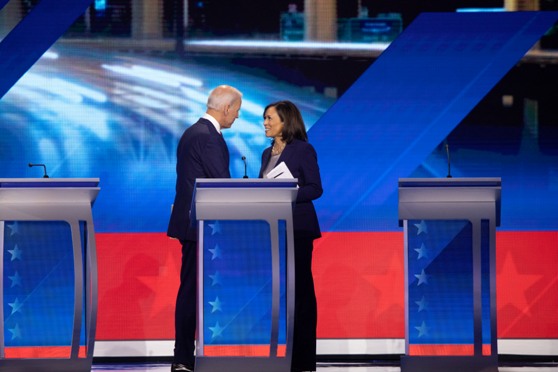Kamala Harris is Biden’s choice for vice president

By Alexander Burns and Katie Glueck
Joe Biden selected Sen. Kamala Harris of California as his vice-presidential running mate Tuesday (11), embracing a former rival who sharply criticized him in the Democratic primaries but emerged after ending her campaign as a vocal supporter of Biden and a prominent advocate of racial-justice legislation after the killing of George Floyd in late May.
Harris, 55, is the first Black woman and the first person of Indian descent to be nominated for national office by a major party, and only the fourth woman in history to be chosen for a presidential ticket. She brings to the race a far more vigorous campaign style than Biden’s, including a gift for capturing moments of raw political electricity on the debate stage and elsewhere, and a personal identity and family story that many find inspiring.
Biden announced the selection over text message and in a follow-up email to supporters: “Joe Biden here. Big news: I’ve chosen Kamala Harris as my running mate. Together, with you, we’re going to beat Trump.” The two are expected to appear together in Wilmington, Delaware, on Wednesday (12).
After her own presidential bid disintegrated last year, many Democrats regarded Harris as all but certain to attempt another run for the White House. By choosing her as his political partner, Biden, if he wins, may well be anointing her as the de facto leader of the party in four or eight years.
A pragmatic moderate who spent most of her career as a prosecutor, Harris was seen throughout the vice-presidential search as among the safest choices available to Biden. She has been a reliable ally of the Democratic establishment, with flexible policy priorities that largely mirror Biden’s, and her supporters argued that she could reinforce Biden’s appeal to Black voters and women without stirring particularly vehement opposition on the right or left.
While she endorsed a number of left-wing policy proposals during her presidential bid, Harris also showed a distinctly Biden-like impatience with what she characterized as the grand but impractical governing designs of some in her party.
“Policy has to be relevant,” Harris said last summer in an interview with The New York Times. “That’s my guiding principle: Is it relevant? Not, ‘Is it a beautiful sonnet?’”
In a Twitter post Tuesday, Harris said she was honoured to join Biden on the ticket. “Joe Biden can unify the American people because he’s spent his life fighting for us,” she wrote.
For all the complexity of Biden’s vice-presidential search, there is a certain foreordained quality to Harris’ nomination. She has been regarded as a rising figure in Democratic politics since around the turn of the century, and as a confident representative of the country’s multiracial future.
Throughout her rise, Harris has excited Democrats with a personal story that set her apart even in the diverse political melting pot that is California: She is the daughter of two immigrant academics, an Indian American mother and a father from Jamaica. Harris was raised in Oakland and Berkeley, California; attended Howard University in Washington, DC; and pursued a career in criminal justice before becoming only the second Black woman ever elected to the Senate.
Still, Harris was far from a shoo-in for the role of Biden’s running mate, and some of Biden’s advisers harboured persistent reservations about her because of her unsteady performance as a presidential candidate and the finely staged ambush she mounted against Biden in the first debate of the primary season.
In an attack that left Biden reeling, Harris outlined his history of working with right-wing Southerners in the 1970s to oppose bussing as a means of integrating public schools. At the same time, Harris said, there was a little girl in California who was part of an early integrated class in her own school. “That little girl was me,” she said.
Biden offered only a sputtering response and, for a few weeks, his polling numbers dived. His political advisers were incensed at what they viewed as a cynical ploy, especially as she later struggled to articulate her own position on mandated bussing; Jill Biden called Harris’ attack on her husband a “punch to the gut”.
Biden also stumbled into an embarrassing moment with Harris at a later debate, claiming at one point that he had the support of the only Black woman ever elected to the Senate — Carol Moseley Braun — and prompting an exasperated response from Harris. “I’m right here!” she responded.
In the end, however, Biden may have come to see the panache Harris displayed in that first debate as more of a potential asset to his ticket than as a source of lingering grievance. Indeed, even in the bleaker periods of her presidential candidacy last year, Harris maintained an ability to excite Democratic voters with the imagined prospect of a debate-stage clash between her and President Donald Trump and her spirited interrogations of Trump appointees as a member of the Senate Judiciary Committee.
-New York Times

